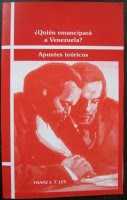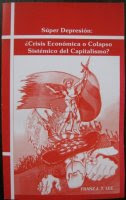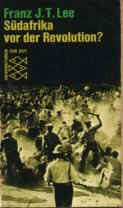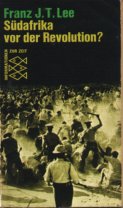FRANTZ OMAR FANON : URGENT LESSONS FOR THE BOLIVARIAN REVOLUTION FROM AFRICA - By Franz J. T. Lee
Racism in Her Majesty's Language:
Black magic, black art, black comedy, black books, black cat, black sheep, blackout, black cap, Blackshirt, Black Pope, Black Monk, Black Maria, Black Peter, Black Orpheus, black widow, black market, blackguard, blackballing, black faced, black browed, black headed, black hearted, black humoured, black hole, blackwater, blackmail, blacklist, blackball, Black Monday, Black Friday, Black Sabbath, Black Muslims, Black Africa, etc., etc., etc.
The conqueror has perpetuated racism in his very language. He identified evil and the devil with black, with the African. We need not only new thoughts, we need a completely new emancipatory language. FRANTZ OMAR FANON : URGENT LESSONS FOR THE BOLIVARIAN REVOLUTION
Date: Sunday, March 27 @ 10:12:12 AST
Topic: Venezuela
By Franz J. T. Lee
A while ago, in a VHeadline commentary we have dealt with the ideological concept "race", its global implications in such terms as "fascism", "racism" or "racial prejudice"; the historic roots of oligarchic racism in Venezuela; its meaning after the globalized bourgeois-democratic capitalist revolution, its colonial, psychological sublimation in mass media communication, morality, ethics, aesthetics, politics, ideology and religion in Venezuela, in Latin America and elsewhere.
See: http://www.vheadline.com/readnews.asp?id=22589
Nearly forty years ago, within the context of armed revolutionary struggle in Africa against metropolitan global hegemony, Franz Omar Fanon has explained to us in Latin America the ideological relation between Capitalism and Racism, especially the transcendental superation of Social Revolution towards Global Emancipation.
In previous commentaries, we have indicated that Social Discrimination , the North American "hegemony complex", its "Full Spectrum Dominance" and "Space Control" syndromes, transmitted as oligarchic racism and "race superiority" to Venezuela ... as generated by the trans-historic, capitalist, imperialist, alienating labor process, as third basic element of its sub-humanizing quintessence ... is nothing else than the superstructural ideological reflex and reflection of the "international division of labor", of the World Market, of the existent, constitutionally ratified social relations of economic private property of the means of production and of mass communication.
In his world-renowned works, Frantz Fanon clearly stated, that there is no Capitalism, no Capital Accumulation, without Racism, that there exists no Racism without Capitalism. In Venezuela, as inalienable social objective of the Bolivarian Revolution, in order to realize "Our Socialism" (Chavez) victoriously, ... that is, in order to emancipate ourselves from savage "neo-liberal" wage-slavery, imperial, oligarchic Capitalism and United States Corporatism ... to eliminate Racism successfully, we have no alternative but to annihilate Capitalism itself on a world scale.
As Fanon indicated in his The Wretched of the Earth (New York, 1965. Reprint of Les damnes de la terre, Paris, 1961), you cannot poison the black mamba with its own reformist venom, you cannot eliminate Capitalism with its own productive and reproductive inventions, with the aims and objectives of the intra-systemic, bourgeois, democratic French Revolution, with its accomplished goal: Globalization.
You cannot serve Christ and Mammon at the same time! Not even in critical times of revolutionary renaissance, especially not in the current transitional, trans-volutionary, trans-historical realities! As he did for centuries, the Yankee shark will immediately snip off our little Latin American finger begging for reformist reconciliation and democratic dialogue. Fanon categorically taught us this simple, intrinsic, essential truism of real Human Emancipation.
Permanent World Revolution, Socialism, is just a sine qua non for Global Human Emancipation, for Free Human Creative Creation.
Furthermore, Fanon warned that with reformist, intra-systemic, social "face-lifting" of a dying, global, capitalist culture in agony, with more "libertarian, egalitarian" redistribution of capitalist wealth, profits, exchange values, goods and "income", with globalized, military "social justice", with constructing newly enriched "middle classes", ... that presuppose lower toiling classes and upper parasitic classes, with political alliances between "Capital and Labor" ... we are just digging our very own working class graves, realizing the ALCA in Latin America, and its corresponding NEPAD (The New Partnership for Africa's Development) in Africa, into whose epicenter already Nelson Mandela and Thabo Mbeki have fallen as tragic "wholesale" victims of the World Bank and the International Monetary Fund. .
Now, what has Racism got to do with the colonized "Human Being", with the still existing puntofijista master-slave, capitalist-worker mentality in Venezuela, to whom Sartre refers to in his Introduction to Frantz Fanon's "Wretched of the Earth"?
This central issue refers to revolutionary class conscience and consciousness, not only in Algeria or Africa, but also in Venezuela and Latin America. It concerns the question ... in spite of the fact that very few comrades officially speak about class struggle in Venezuela ... whether de facto the Venezuelan masses during the "Caracazo" (1989) and the "Military Coup" (2002) had acted class consciously in a radical revolutionary sense or not, or both, or even neither the one nor the other.
To answer this imperative question scientifically, a revolutionary psychology within an emancipatory theory would be necessary, which obviously cannot be elaborated here.
However, precisely to counter social discrimination, in all its forms, to develop a new revolutionary theory, a theory of emancipation, already Fanon suggested the development of a New Psychology of Colonial Relationships.
His new revolutionary ideas about Psychiatry and the Nature of Therapy he expounded in his famous writings: The Wretched of the Earth, Black Skin, White Masks (New York: Grove, 1967, Reprint of Peau noire, masques blancs, Paris, 1952); and Toward the African Revolution (New York, 1967, Reprint of Pour la revolution africaine, Paris, 1964).
However, to explain Fanon's New Práxis and Theory, his "New Socialism", like in the case of Simon Bolivar and Hugo Chavez Frias, we cannot divorce their Praxical Science and Theoretical Philosophy, from their true life, from their real historic context. Very briefly, just underlining the most important events, for those who are not yet acquainted with Fanon, here is his historic life.
FRANTZ OMAR FANON, the West Indian Psychoanalyst and Social Philosopher, was born in 1925 in French Martinique, and he died on December 6, 1961, in Washington, D. C. In his youth, he received his basic education in Martinique and France. During the intra-imperialist European World War II, alongside with Senghor, he was serving in the French Army; later he completed his studies in medicine at the University of Lyon. Then he left for Algeria, where, between 1953 and 1956, he directed the Psychiatry Department of the Hospital Blida-Joinville.
In 1954 he joined the liberation movement, and two years later he became Editor-In-Chief of its famous newspaper, El Moudjahid, published in Tunis. Thereafter a rebel "Provisional Government" was formed, and in 1960, Fanon became its Ambassador to Ghana.
His famous work, The Wretched of the Earth, whose title he took from the socialist song, the International, "was published by Jean-Paul Sartre in the year of his death. Fanon died at the National Institutes of Health in Bethesda, Maryland, where he had sought treatment for his cancer, on December 6, 1961. At his request, his body was returned to Algeria and buried with honors by the Algerian National Army of Liberation."
(For more information, see: http://www.english.emory.edu/Bahri/Fanon.html )
Now, because they belong to his short biography, let us make some remarks about his two major works, written between 1952 and 1961.
Peau noire, masques blancs, Black Skin, White Masks, reflects his personal frustrations with colonial discrimination, with racism. In his early youth, Fanon came to the conclusion that he should know, should understand himself, his essence, as he is, as the world sees him. This is why he became a writer, a writer of essence, a political science writer.
This age-old "Know Thyself!" is pertinent for the Bolivarian Revolution, it is the origin of an individual class consciousness, of eventual social, revolutionary, working class consciousness.
He taught us what to do, what to think in our revolutionary Bolivarian Circles, Missions and Endogenous Social Projects.
Fanon wanted to write down, to understand the absurdities and possibilities of rationalization of the world in which he lived.
He wanted not only to communicate to others, but he also wanted to communicate the possibility of their common experience, of making the revolution, of creating emancipation. Exactly in this process, like us, he was confronted with Global and Globalized Info-War, with Conspiracy Hoaxes, Big Lies, with Social Discrimination, with Racism.
As Caribbean, as Venezuelan, as a Martiniquean, "whitened" by bare- and pale-faced colonialism, but stark "black" in the blue aristocratic eyes of "Colon", of the colonizer, of the oligarchs, but also in the brown hateful eyes of the colonized, he wanted to analyze psychologically, ideologically, the roots of this evil, of Racism, and to develop a real, revolutionary, emancipating "panacea" against this social plight of (wo)mankind.
At the age of 27, Fanon published Peau noire, masques blancs, and his world outlook had already transcended simple human relationships, the simple explanation of isolated events. His philosophic thought became more complex, more complicated, more theoretical; this was the only way intellectually to grasp universal social and colonial complexities.
As was already true in the case of Simon Bolivar himself, we should learn from Fanon, how to eradicate our inculcated hatred against theory, to eliminate our favorite ideologies, our religious doctrines and dogmas, our intellectual slackness, our mental concreteness and our fear of "ivory-tower" philosophy, once and for all.
In fact, in the very bloody, revolutionary, armed struggle, Fanon was thinking, which is no Sunday afternoon window-shopping spree, was studying Hegel's " Phenomenology of the Mind" and Sartre's "Being and Nothingness".
At the Bolivarian Universities, just for a humble start, adding Marx's Capital, we would urgently recommend the conscientious study of these, including the works of the Latin American "dependence" thinkers, to all comrades.
Because President Chavez is already reading Trotsky's "Permanent Revolution", we have no excuse whatsoever not to do likewise, and to begin to philosophize ourselves. Consequently, what were the precognitive, cognitive and retrocognitive, philosophic results of Fanon's intellectual and rational endeavors?
He came to the conclusion ... arriving at the vital question, whether it was possible, that in a revolutionary way, the "colonized" ... that all those like him, all those black skins, with white masks, could live in emancipated relations and solidarity, could form historic, disalienated relationships.
As a result of his psychological, economic, political and social studies, like in the current revolutionary spirit of President Chavez of Venezuela, as mentioned above, he posited a praxical solidarity of real sentiments among the "colonized"; he analyzed their "false" identity, the falsified "roots" of their identity, and underlined their unsustainable capitalist exploitation and social deprivation.
Furthermore, he pointed out that the so-called individual exists in a social nexus, caught in an enormous WEB, which neither Marx nor Freud had, or could describe in its ultimate finesse. None of them, and many others, had concerned themselves with "blacks", with "coolies", with "camel drivers", with their "psyche", with their life conditions and problems. These "Third World", third-class "speaking tools", these dirty, stinking "pack animals" were simply not worth of any psychological or philosophical consideration; their "animal instincts" did not serve, neither for the use nor for the abuse of aristocratic or bourgeois, democratic "Philosophy" (See: Voltaire, Montesquieu, Hegel, and even Marx and Engels).
Now, Bolivarians, what liberating method did Fanon suggest for urgent revolutionary consideration?
A very simple, but realistic one. He considered the relations between "colonized" and "colonizers", between masters and slaves, between capitalists and workers, between Cisneros and "tin-collectors", as part of a rigid global system. To "unlock" them, he suggested a revolutionary metamorphosis of these basic relations. This involved, individually, a constant active and thinking process for recognition, based on the achievement of a more developed form of thinking, of consciousness, of revolutionary theory, not ideology, and to develop permanently new subjectives, objectives and "transjectives" of emancipation.
Painting a detailed Rembrandtesque picture ... concerning revolutionary co-operatives in Venezuela ... collectively, he urged, that a new process of rediscovery should be launched, not influenced by colonial capitalist education or imperialist history, that a revision and revaluation of one's own past and that of all oppressed, dominated and discriminated classes should be undertaken, and that ultimately a monstrous system would be discovered, of global conquest, robbery, pillage and lies, which has to be destroyed by all means necessary, including emancipatory violence, in order to pave the road towards a new "(wo)man", who would be conscious of him/herself, and who would assume a new emancipated identity.
This, also described by Che Guevara, as his " Nuevo Hombre", his "New Man", should be the revolutionary quintessence of all our Venezuelan educational endeavors, of our missions, of our schools and universities.
However, now coming to the essential part of Fanon's famous classic, what did he explain about self-defending, emancipatory violence?
What did he suggest that we should do to counter the eternally threatening North American fascism and terrorism?
Against global, globalized corruption, intrigues, conspiracies, genocide, manipulation, indoctrination, mind control, Fanon, to liberate Algeria, Africa and the rest of the "Third World", individually and socially, in his Wretched of the Earth, advocated self-defense, revolutionary counter-violence, as remedy against all the psychological and physical damage caused by colonialism and imperialism on a global scale.
Why did Fanon arrive at this radical emancipatory solution?
Fanon was convinced that violent counter-revolution, that is, emancipatory self-defense, was the only means for the hundred millions of impoverished peasants, the suffering "lumpenproletariat" and toiling or unemployed workers of Africa (for his revolutionary subjects), of ending their terrorist, colonial exploitation, repression, discrimination, psychological alienation and cultural traumas.
He explained that revolutionary armed struggle "was a cleansing force. It frees the native from his inferiority complex and from his despair and inaction; it makes him fearless and restores his self-respect."
In his previous work, he already explained this personal drama of all "black" and "coloured" peoples, as follows:
"I have no wish to be the victim of the Fraud of a black world. My life should not be devoted to drawing up the balance sheet of Negro values. There is no white world, there is no white ethic, any more than there is a white intelligence. There are in every part of the world men who search. I am not a prisoner of history. I should not seek there for the meaning of my destiny. I should constantly remind myself that the real leap consists in introduction, invention into existence. In the world through which I travel, I am endlessly creating myself."
(See: Frantz Fanon, Black Skin, White Masks, 1952)
Leaving his personal experiences aside for the moment ... the many attempts to assassinate him, which are already sufficient reasons to arrive at such "radical" conclusions ... his emancipatory thesis, as expressed in his notion of the cathartic effect of counter-violence, of this "cleansing force", of this "royal pardon", was, that decolonization, emancipation, could not be victorious, as a first step. if the "wretched" did not seize political power from the "colonizers", by means of a violent, armed, popular liberation struggle, if every individual did not participate in this healing process, to expunge her/himself from the evils of colonialism and imperialism, from the sado-masochistic relations, inferiority complexes, auto-aggression, envy of colonial privileges, of master and servant relations, of the slave mentality, etc. Only, thereafter, economic and social emancipation can be launched effectively.
Here, he insisted that everyone must take a bite in this bitter capitalist apple, to find, to identify, to know oneself, to discover the revolutionary proof by eating the sour (neo-)colonial racist pudding all by oneself. In this way, the roots of social revolutionary class struggle can be nurtured in fertile emancipatory soil, in Africa, Asia, in America, in Venezuela, and elsewhere.
Relevant today, for Fanon, this simply means that in emancipatory self-defense, in the liberation class war, the bloody path chosen by the global warlords, to kill the "colonizer" in one's very colonized "soul", was on planet Earth to kill forever both the "colonizer" and the "colonized" with the very same revolutionary, dialectical act. According to him, only this can be Africa's "royal pardon" in relation to imperialist Europe, to corporate America, and to Clobal Fascism. This is what it means to arm oneself, to pick up arms against a globalized "sea of troubles".
This is currently the choice which Washington D.C. has left to Iran, Venezuela and the "axis if evil". !
In Venezuela, whether we like it or not, only this emancipatory counter-violence can separate scientifically the obsolete, puntofijista, reactionary, counter-revolutionary chaff, ... nationally and internationally already in an advanced stage of historic decomposition ... from the healthy, germinating, genetically and mentally, not modified, not controlled wheat within the very Bolivarian revolution itself.
This is applying a class analysis, the class struggle, to the Bolivarian revolution itself.
This is also the "cleansing force", the "cathartic effect of counter-violence", the emancipatory purification of the Bolivarian Revolution.
This is real, true Revolution in the Revolution.
In conclusion, in this sense, Fanon described our current (neo-)colonized world in Latin America and elsewhere, as a manichean reality, as a compartmentalized structure, in which the worst, alienating, European and North American, colonial, import products, the corrupt, bureaucratic, juridical and religious systems, have played, and are still playing, havoc with our bodies, brains and minds.
These are the real social dangers facing the future of the Bolivarian Revolution.
At the same time, he criticized Marxism, which did not analyze and which failed to include the "wretched classes", the "barbaric and semi-barbaric" peoples in its emancipatory práxis and theory. This error we should not commit, it will have fatal results for our very existence.
Finally, for further details, for more profound studies, concerning the above, in his work, "For the African Revolution", Fanon explained the specific elements of the application of his revolutionary theory of counter-violence, of organizing the global liberation struggle.
Concerning his real contribution to African Emancipation, Ntongela Masilela explains the following to us:
"In a Presence Africaine issue of 1962, in a section devoted to homages concerning Fanon, Aime Cesaire, the great Martiniquan poet and Fanon's mentor, eulogized him as the theoretician of revolutionary action and of the process of decolonization.
Kwame Nkrumah, then the President of Ghana and the living embodiment of the Pan-Africanist philosophy, in the same review, characterized Fanon as the liberator and emancipator of Africa, whose ultimate aim was to bring about the unification of Africa.
Jean-Paul Sartre, the French exponent of Existentialist philosophy, then in the process of attempting to forge a synthesis between Existentialism and Marxism in his colossal but digressive book, Critique of Dialectical Reason , published in 1960, in a preface to Cesaire's play of 1966 Une saison au Congo about the tragic Congo events of 1960, wrote that both Lumumba and Fanon were great men who died at the same age and in the same year; their different historical visions and political praxes represented that which was pre-eminently the best in human culture and civilization.
In this essay on the political thought of Patrice Lumumba, which in fact is a great document of our century in which a great European philosophical mind grappled with the tragic flaws of an African political genius, Sartre stated that concerning Fanon still much needs to be said. As far as Lumumba, Sartre felt his tragedy lay in the fact that he was a revolutionary without a revolution, a Black Jacobin in the era of African nationalisms. For Fanon, the tragic failure of Lumumba in the Congo (today Zaire), was the failure of a politically disunited and inexperienced Africa."
http://pzadmin.pitzer.edu/masilela/general/essays/fanon2.htm













No comments:
Post a Comment